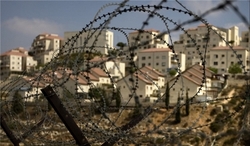 A group of European foreign ministers have called on the European Union (EU) — Israel’s largest trade partner — to take concrete and timely steps to “deter” the Tel Aviv regime’s unlawful plan to annex large parts of the occupied West Bank
A group of European foreign ministers have called on the European Union (EU) — Israel’s largest trade partner — to take concrete and timely steps to “deter” the Tel Aviv regime’s unlawful plan to annex large parts of the occupied West Bank Rasa - In a letter to the EU foreign policy chief, Josep Borrell, last Friday, eleven EU ministers demanded that the bloc quickly formulate a list of possible responses to the Israeli land grab bid, warning that “the window to deter annexation is fast closing.”
The letter — a copy of which was obtained by Israeli daily Haaretz and released on Tuesday — was signed by the foreign ministers of France, Italy, Holland, Ireland, Belgium, Luxembourg, Sweden, Denmark, Finland, Portugal and Malta.
“The possible annexation by Israel of parts of the occupied Palestinian territory remains a matter of grave concern for the EU and its Member States,” the ministers wrote.
These ministers first demanded that Borrell formulate responses to the Israeli annexation plan at an unofficial meeting with him on May 15. In response, he ordered his staff to prepare a list of possible responses.
However, this document, known as an “options paper,” still hasn’t been completed and shown to the foreign ministers who requested it, the letter complained.
“As you referred to in your statements of February 4, 2020 and May 18, Israel’s annexation of parts of the occupied Palestinian territory would be a breach of international law,” they wrote.
The signatories said they understood that the options paper “is a sensitive issue and timing is important, but time is also short. We are concerned that the window to deter annexation is fast closing.”
“It is important to have clarity on the legal and political implications of annexation,” they continued. “Therefore we would like to see a paper, drafted in close consultation with the Commission, that provides an overview of the EU-Israel relations, an analysis of the legal consequences of annexation, as well as a list of possible actions in response to it… Such an options paper would also contribute to our efforts to deter annexation.”
“We believe it is important and timely to present the options paper, as it would provide us with a solid basis for further discussions,” they concluded.
Israel’s unlawful annexation push has drawn widespread criticisms from the entire international community, including the regime’s closest allies.
The United Nations, the European Union and key Arab countries have all said the West Bank annexation would violate international law and undermine the prospects of establishing a sovereign Palestinian state on the 1967 boundaries.
The international community views the entire West Bank and the eastern part of the occupied city of Jerusalem al-Quds as lands that could become home to an independent Palestinian state in future.
Israel’s land grab bid threatens regional peace: Jordan
Meanwhile on Monday, Jordan’s King Abdullah II once again warned that any Israeli annexation plan under a US-backed scheme would threaten stability in the Middle East and dash hopes of a solution to the decades-old Israeli-Palestinian conflict.
Addressing British defense parliamentary committee members in a virtual meeting on Monday, Abdullah said the only path to a comprehensive and lasting peace in the region was the establishment of an independent and sovereign Palestinian state based on pre-1967 borders with East Jerusalem al-Quds as its capital.
“Any unilateral Israeli measure to annex lands in the West Bank is unacceptable, as it would undermine the prospects of achieving peace and stability in the Middle East,” the monarch was quoted as saying in a palace statement.
The Jordanian king has also in recent months warned that Israeli policies along with Trump’s so-called peace plan would lead to conflict and deal a blow to Israeli-Jordanian relations.
US President Donald Trump has already supported Israeli annexation of occupied Palestinian territories in his self-proclaimed “deal of the century,” which was unveiled in January with the aim of re-drawing the Middle East map.
Prime Minister Benjamin Netanyahu had set July 1 as the start-date for implementing the annexation plan, but the measure has been put on hold amid an internal rift in Netanyahu’s coalition cabinet. The White House has reportedly conditioned its support for the deal to a collective consensus among Israeli officials.